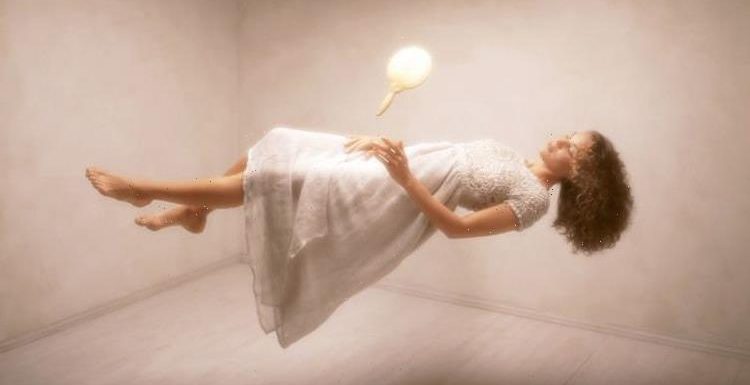
Life after death: Expert discusses research into topic
We use your sign-up to provide content in ways you’ve consented to and to improve our understanding of you. This may include adverts from us and 3rd parties based on our understanding. You can unsubscribe at any time. More info
Out-of-body experiences are a fairly common phenomenon with an estimated 10 percent of people experiencing them at least once in their life. The OBEs can be triggered by a wide array of factors – from brain tumours to epilepsy – but are often associated with so-called near-death experiences, or NDEs. Cardiac arrest patients, in particular, frequently recall a sensation of floating outside of their bodies or even looking down at their hospital beds from the ceiling.
One woman who temporarily died as a child believes her spirit escaped her body before being sucked right back in.
A similar account was shared by a man who claimed to have left his body after suffering a near-fatal heart attack.
For many people, these experiences are deeply profound and serve to inform their beliefs in God, the afterlife and give them some sort of “meaning in life”.
Scientists are, however, unconvinced about the spiritual aspect of OBEs and instead point to a growing body of evidence that might explain what is going on in the brain during these phenomena.
Dr Jane Aspell, a cognitive neuroscientist at Anglia Ruskin University, has been experimenting with OBEs through the use of virtual reality headsets to better understand how the brain creates an identity of the “self”.


And the technology could even have medical applications by helping people who suffer, for example, from dissociating disorders or painful conditions like fibromyalgia.
But are OBEs evidence of the soul escaping the body in a moment of trauma? Most likely not.
Dr Aspell said: “They’re incredibly real and they seem very real to the person having them. They have this very strong experience.
“It seems as though their ‘self’, or their consciousness, or their soul, or their spirit – whatever they want to call it – seems to be separate from their body.
“And that, naturally, can lead people to conclude, ‘Okay, that must mean I have a soul or my mind or my consciousness isn’t tied to my body.’
“And when it occurs in the context of potentially dying, I think it’s not surprising that that conclusion is led to.”
The brain is a very “plastic” instrument and under the right conditions, the expert said it can be easily confused.
What really happens during OBEs such as the ones described by patients floating above their bodies, is that the brain creates very vivid hallucinations.
Afterlife: Expert discusses 'feelings' in near-death experiences
If a person is asked to draw a picture of their bedroom from their memory, chances are they will draw a fairly accurate representation of the room and the items within, provided they have enough time to properly think about the task.
That is essentially what is happening during an OBE but spontaneously and without notice.
Consequently, the hallucinations created by the brain are usually inaccurate and lacking in information.
Studies have been carried out in emergency rooms where people who have experienced OBEs were asked to describe their surroundings.
The patients were not told about objects hidden away high up and out of reach and the items did not appear in their testimonies, proving patients never floated up to the ceiling but rather the experience unfolded entirely in the brain.
Scientists still don’t know exactly why this happens but the evidence is clear – it is a matter of some disturbance in the brain and OBEs can happen to just about anyone.
Dr Aspell said: “We don’t know the details of how the brain does that but it certainly seems like it’s a hallucination.


“And some people think that an out-of-body experience is evidence the consciousness can survive outside of the body or can separate from the body.
“But there’s certainly a more credible explanation that it’s the brain going a bit haywire and you’re having a hallucination.
“People have tried but they never have been able to give any evidence that it is the case consciousness can survive or exist outside of the body.”
Dr Aspell has been experimenting with inducing a type of OBE in volunteers using virtual reality headsets.
The volunteers were asked to don a headset showing them a video stream from a webcam positioned directly behind them.
When they were tapped on the back, they would see themselves being tapped and feel as if they were no longer in their own body.
Dr Aspell said: “You feel as though you are in the body in front of you.”
The technique, she believes, could have applications in reducing chronic pain or in helping people suffering from intense trauma.
Dr Aspell’s studies are being funded by the Versus Arthritis charity and The Bial Foundation.
And she will appear at the British Science Festival next week to discuss her body of work – and you can join the event for free.
The British Science Festival is being co-organised by Anglia Ruskin University in Chelmsford between September 7 and 11.
Antonio Benitez, Director of the British Science Festival, said: “We have curated a range of events that highlight local stories, issues of international relevance and celebrates the breadth and creativity of the cutting-edge research taking place in Chelmsford and across the UK.
“There will be opportunities to explore issues relating to the pandemic and other pressing concerns such as climate change, or alternatively to get as far away from the day-to-day as possible with interactive and immersive installations and experiences.”
Source: Read Full Article